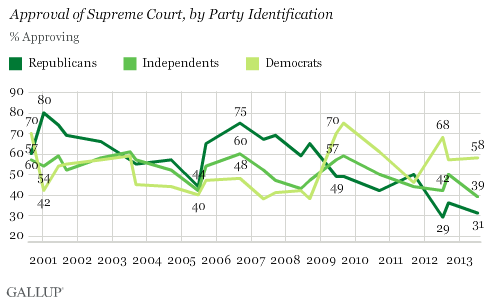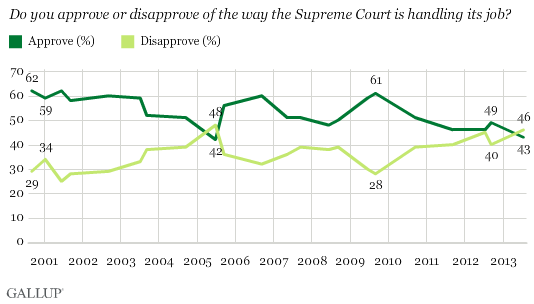A recent Gallup poll shows a near-all-time low for popularity of the Supreme Court.
Slightly more Americans disapprove of the court (46%) than approve, which has happened only one other time since Gallup first asked this question in 2000.
What’s interesting is that more Republicans are unhappy with the Court than Democrats.
Less than a third (31%) of self-identified Republicans approve of the Supreme Court, close to the record low of 29% measured shortly after the court’s ruling on the healthcare law last year. While a majority of Democrats, 58%, approve of the high court, their approval is now lower than it was in July of last year, when 68% approved. Independents, meanwhile, register a 39% approval rating of the court, the lowest measured for this group since Gallup first asked the question.
 And the Chief Justice’s popularity has continued to decline.
And the Chief Justice’s popularity has continued to decline.
U.S. Supreme Court Chief Justice Roberts’ favorable rating has fallen to a new low of 31% from 39% in July 2012, shortly after Roberts as part of a five-member majority upheld the Affordable Care Act. Twenty-seven percent of Americans now disapprove of Roberts. Interestingly, 42% have no opinion of him, up from 31% in July 2012, when Roberts was a central figure in the news due to the ACA ruling.
Prior to 2012, Gallup previously measured Roberts’ favorability during his nomination hearings in September 2005. At that point, his image was more positive, with 50% of Americans viewing him favorably and 17% unfavorably.
I don’t put much stock in this poll, as the majority of Americans have absolutely no clue who the Chief Justice is (8% think Thurgood Marshall is CJ). I imagine that this number probably tracks overall popularity of the Court.
So what do we make of this data? Specifically, how do we place it in the arc of popular opinion emanating from NFIB v. Sebelius.
Did the Chief misjudge what would happen if he voted to strike down the mandate (for real)? Is the Court now more unpopular because the Court avoided that outcome? Republicans dislike the Court more than Democrats? Maybe the Court should have been more comfortable in striking down the law.
I repost my earlier thoughts, where I consider a counterfactual.
Counterfactuals are impossible for the very reason that we can never know what would happen under different circumstances. But, if I may indulge you, let’s speculate.
What do you think would have happened to the Supreme Court’s popularity if the Cout struck down all of Obamacare. The President would have spent much of the 2012 re-election campaign talking about the Supreme Court, stressing how it was political, calling on Americans to vote for him to ensure that he can appoint judges, implicitly suggesting that they would vote his way (not to dissimilar from his D.C. Circuit rhetoric). In reality, the Supreme Court was not mentioned at any time during any of the 2012 debates (other than a stray mention of Roe during VP debate).
After NFIB was decided, many pundits saw a small drop in the Supreme Court’s favorability rating along with a high unpopularity scoring of Obamacare, as evidence that the Chief misjudged the will of the people, and that the Court would have been okay had they struck down the ACA. As I note inUnprecedented, I don’t find this short timeframe particularly helpful.
Although polling data in the immediate aftermath of NFIB showed a negligible dip in the approval rating of the justices, and the ACA remains to this day quite unpopular—suggesting that people would have been happy with the Court striking down the law—the important timeframe to measure damage to the Court’s reputation is not measured in weeks or months, but in years and decades. These generational shifts, subtle at first, are often hard to perceive. For- tunately, much of the potential damage in this case was averted, as NFIB turned out in Obama’s favor. There was no need to interject the Court into the 2012 election. But had NFIB gone in a different direc- tion, the aftermath of this constitutional clash could have turned into another crucial chapter in this downward decline.
A significant portion of Americans *still* do not know what Obamacare’s mandate is. How they view the Court’s decision to uphold it, in the immediate aftermath of NFIB doesn’t tell us much (other than if they like Obama or not). What does matter is the long-term trend line of the Court’s credibility.
We will never know which way this counterfactual would have gone, but I think it is instructive to consider it before celebrating the Court’s polling numbers as proof that the Chief made the wrong call. I don’t think the goal was making the Court *more* popular. Obamacare was a no-win situation. I think he tried to minimize the damage, and stem rising unpopularity. Arguably, he did just this.
